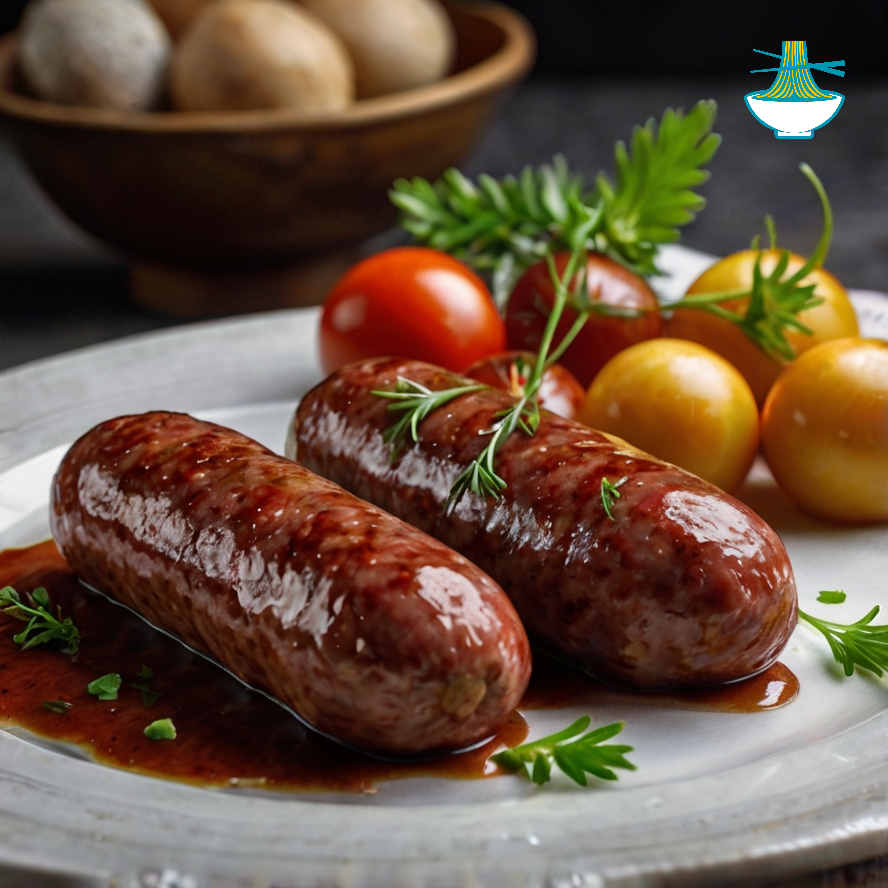Kazy, a beloved delicacy in Central Asia, particularly Kazakhstan and Kyrgyzstan, is a traditional sausage made from horsemeat. Dating back centuries, its origins lie in the nomadic lifestyle of the region's inhabitants, where horses were not only transportation but also a vital food source. 
To prepare Kazy, high-quality horsemeat is carefully selected and seasoned with a blend of spices such as salt, pepper, garlic, and sometimes cumin or coriander. The meat is then stuffed into natural casings and traditionally smoked or air-dried for preservation.
This recipe embodies the cultural heritage and culinary traditions of Central Asia, reflecting the resourcefulness and ingenuity of its people. Today, Kazy remains a cherished dish, enjoyed on special occasions and gatherings, preserving the rich flavors and history of the region.
Ingredients:
- 1 kg horsemeat (lean and finely ground)
- Salt to taste
- Black pepper to taste
- 4-5 cloves garlic (minced)
- Optional: 1 teaspoon ground cumin or coriander
Method:
1. In a large mixing bowl, combine the ground horsemeat with salt, black pepper, minced garlic, and any optional spices of your choice.
2. Mix the ingredients thoroughly until well combined.
3. Prepare natural casings by rinsing them under cold water and soaking them in water for about 30 minutes to soften.
4. Stuff the seasoned horsemeat mixture into the casings, tying off the ends securely.
5. If desired, you can smoke the sausages using a smoker or hang them in a well-ventilated area to air-dry for a few days, turning occasionally.
6. Once smoked or dried, Kazy is ready to be enjoyed. Slice it thinly and serve as a delicious delicacy alongside bread, cheese, and other accompaniments.
This straightforward recipe captures the essence of Kazy while keeping the ingredients and method clear and uncomplicated, perfect for both novice and experienced cooks alike.
Nutrition Value:
1. Horsemeat (1 kg):
- Calories: Approximately 2,200 kcal
- Carbohydrates: 0g
- Protein: Approximately 220g
- Fat: Approximately 140g
- Sodium: Varies depending on seasoning and processing methods
- Cholesterol: Approximately 600mg
- Vitamins and Minerals: Rich in B vitamins (especially B12), iron, zinc, and selenium
- Nutritional Benefits: Horsemeat is a lean protein source that provides essential nutrients like iron for energy metabolism, zinc for immune function, and B vitamins for overall health.
2. Salt (to taste):
- Calories: 0 kcal
- Carbohydrates: 0g
- Protein: 0g
- Fat: 0g
- Sodium: Varies depending on the amount used
- Cholesterol: 0mg
- Vitamins and Minerals: None significant
- Nutritional Benefits: While salt adds flavor to the dish, excessive consumption should be monitored due to its potential impact on blood pressure and cardiovascular health.
3. Black Pepper (to taste):
- Calories: 0 kcal
- Carbohydrates: 0g
- Protein: 0g
- Fat: 0g
- Sodium: 1mg (per 1/4 teaspoon)
- Cholesterol: 0mg
- Vitamins and Minerals: Contains small amounts of manganese, vitamin K, and iron
- Nutritional Benefits: Black pepper is rich in antioxidants and may have anti-inflammatory properties. It also enhances digestion and may aid in nutrient absorption.
4. Garlic (4-5 cloves, minced):
- Calories: Approximately 20-25 kcal
- Carbohydrates: Approximately 5g
- Protein: Approximately 1g
- Fat: 0g
- Sodium: 1mg
- Cholesterol: 0mg
- Vitamins and Minerals: Rich in vitamin C, vitamin B6, manganese, and selenium
- Nutritional Benefits: Garlic has antimicrobial properties and is known to support heart health, boost the immune system, and reduce inflammation.
5. Optional: Ground Cumin or Coriander (1 teaspoon):
- Calories: Approximately 8 kcal
- Carbohydrates: Approximately 1g
- Protein: Approximately 0g
- Fat: Approximately 0g
- Sodium: Varies depending on the amount used
- Cholesterol: 0mg
- Vitamins and Minerals: Contains small amounts of iron and manganese
- Nutritional Benefits: Cumin and coriander add flavor to the dish and may have digestive benefits. They also contain antioxidants and may have anti-inflammatory properties.
These nutritional components contribute to a balanced diet, providing essential nutrients while adding flavor and variety to the dish.


Comments